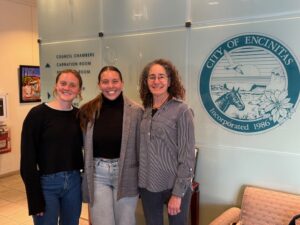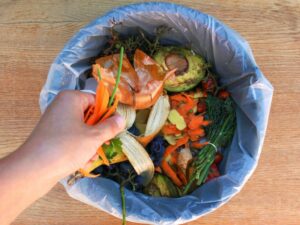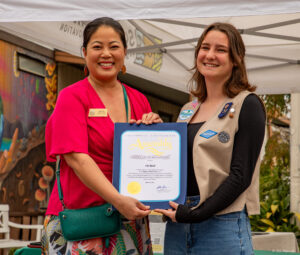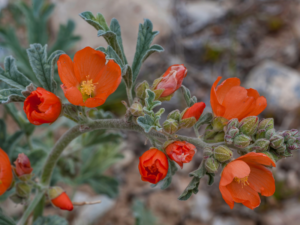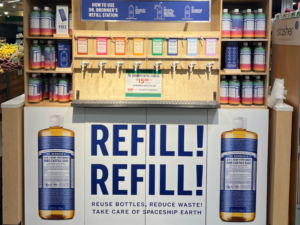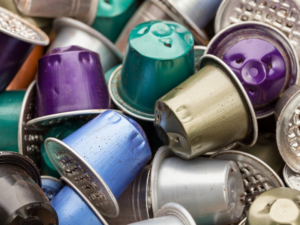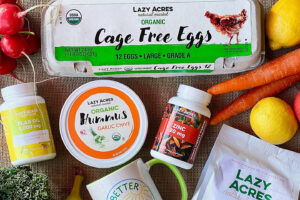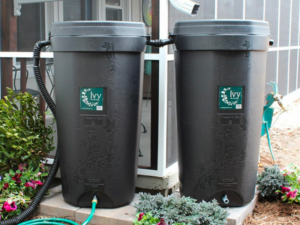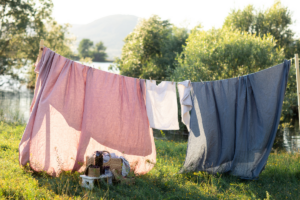Resource conservation
Commercial Surplus Food: Data & Extraordinary Successes
Our team presented to the City of Encinitas Environmental Commission about SB1383 and how Solana Center is helping businesses prevent food waste. Executive Director Jessica Toth, Associate Manager Larissa Amaral, and UCSD Scripps Researcher Skylar Enge shared our success in preventing food waste and edible food donations to families in need. California’s SB 1383 is…
Read MoreClimate Solutions: Save Water This Summer With Compost!
In Southern California, it is critical that we conserve water. A great way to tackle the water challenge is to incorporate compost into your summer garden and landscape. In addition to providing valuable nutrients, compost has been proven to increase soil’s water retention capacity. Here are a couple of ways to incorporate compost into your garden…
Read MoreTaking on Textile Waste 2024
The Taking on Textiles event was held on March 23, 2024 at Solana Center for Environmental Innovation in Encinitas, CA. It was open to the public. We were grateful for recognition from California Assemblymember Tasha Boerner’s office. District Director Janet Chin spoke to the importance of the event as an early beacon to the increasing…
Read MoreHow Can Cutting Your Food Waste Help the Climate?
Food waste is a common problem many households and food establishments are faced with. Throwing away food scraps and leftovers that could have been eaten seems like an easy solution but in reality has devastating outcomes. When food waste enters a landfill, it begins contributing to greenhouse gas emissions due to the anaerobic environment. When food…
Read MoreFour Ocean-Friendly Gardening Tips
Many San Diegans are concerned about keeping our waterways clean. In fact, surveys conducted across San Diego County show that more than 50% of residents believe that pollution of our creeks, lakes, and beaches directly affects them and their families. Yet in many urban areas, water runoff is the #1 source of ocean pollution. This…
Read MoreDr. Bronner’s Is Reducing Its Plastic Use
🌎 Dr. Bronner’s is taking bold steps to reduce plastic production and pollution. 🌎 How? 🌈 All of Dr. Bronner’s plastic bottles are 100% post-consumer recycled plastic, reducing new plastic production 🧴 🌈 The B Corp recently introduced a new paper soap refill carton. This carton is made with 80% less plastic and uses fewer…
Read MoreClimate Solutions: How to Recycle Your Coffee Pods
Sustainability and equity in coffee are multilayered. Growing the crop is a water- and often land-intensive process, and plenty of conventional farmers use pesticides and underpay workers to create cheap coffee. By buying that coffee, we as consumers incentivize exploitation. We may also be risking more expensive coffee in the future, as climate change is…
Read MoreLazy Acres: 1% for the Planet Nonprofit Partnership
Thank you Lazy Acres Natural Market for partnering with Solana Center for Environmental Innovation as a beneficiary of the 1% program! In 2023 we were one of the first local nonprofits selected for the enviro-tokens program. The enviro-tokens program offered Lazy Acres customers the option to donate 10 cents to the nonprofit of their choice…
Read MoreIt’s Time to Install Your Rain Barrel
Did you know that rainwater is the best water for plants? Though San Diego’s average rainfall is less than 12 inches a year, a rain barrel configured to receive water from your home’s downspouts can help you store up to 50 gallons of free, untreated water on your property. Think about misty mornings too. Water…
Read MoreFrugal Ways to Reduce Your Climate Footprint
In the age of Teslas, solar panels, and buying organic, it can feel like sustainable choices are only for the rich. But the facts show otherwise, with the “wealthiest 1% of people in the world putting out as much carbon pollution as the poorest two-thirds,” according to a November 2023 Oxfam report. Generally, working class…
Read More
